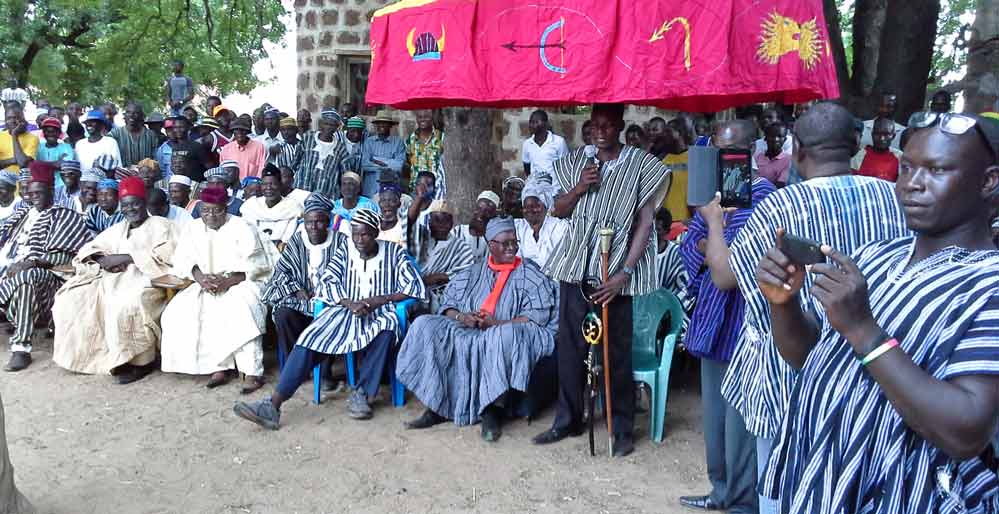 |
|
The Paramount Chief, Azagsuk (red scarf), and three Bulsa chiefs (in red caps) from Wiesi, Fumbisi and Gbedema |
Ghanatta Ayaric
Gbedembilisi Elects a New Chief
(29th July 2014)
 |
|
The Paramount Chief, Azagsuk (red scarf), and three Bulsa chiefs (in red caps) from Wiesi, Fumbisi and Gbedema |
The people of Gbedembilisi, one of the six villages that constitute the new Bulsa South District, elected a new chief at a colourful ceremony which took place at the Traditional Council grounds in Sandema. The occasion marked Sandemnaab Azagsuk Azantilow II’s first officiating role as paramount chief of Bulsa with the right to install other new Bulsa chiefs, a role his father, Naab Azantilow Ayieta, played during his long reign, installing almost all the current chiefs in Buluk. The three contestants for the Gbedembilisi chieftaincy were great grandsons of Akandemeina who was installed by the Mamprusi King in approximately 1941 and ruled until 1953.
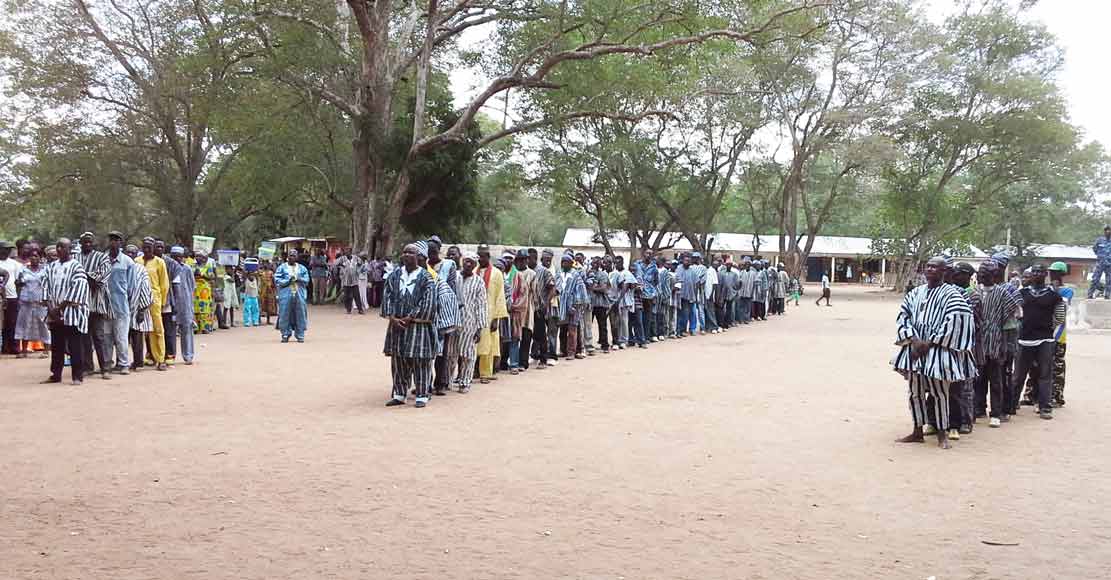 |
|
The election: The supporters file behind the contestants Middle: The successful contestant, Ignatius Atirekpere |
He was succeeded by his son, Atirekpere Akandemeina. The latter ruled until approximately 1976 and was succeeded by his son, Amoabil Atirekpere, who ruled from 1976 to 2009. When he died his son, Ignatius Atirekpere, became regent of Gbedembilisi until his election in 2014. Ignatius Atirekpere won by a clear majority, getting 63 of the total 75 votes. The other two contestants got 6 votes each. After receiving his red chieftaincy cap from the paramount chief, the young chief was sprinkled with white powder by his supporters, carried shoulder high and taken round the grounds amid drumming, dancing, singing and intermittent shrill ululations.
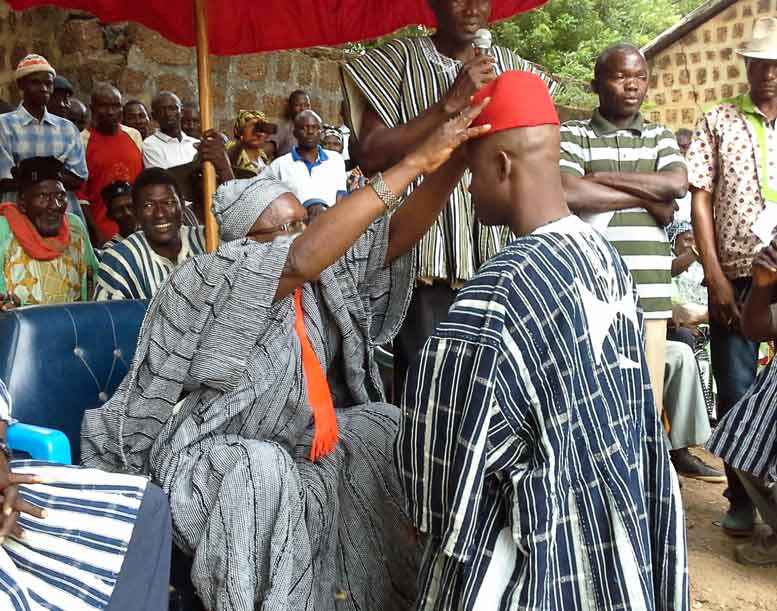 |
|
The new chief is "crowned" with a red cap by the Paramount Chief. |
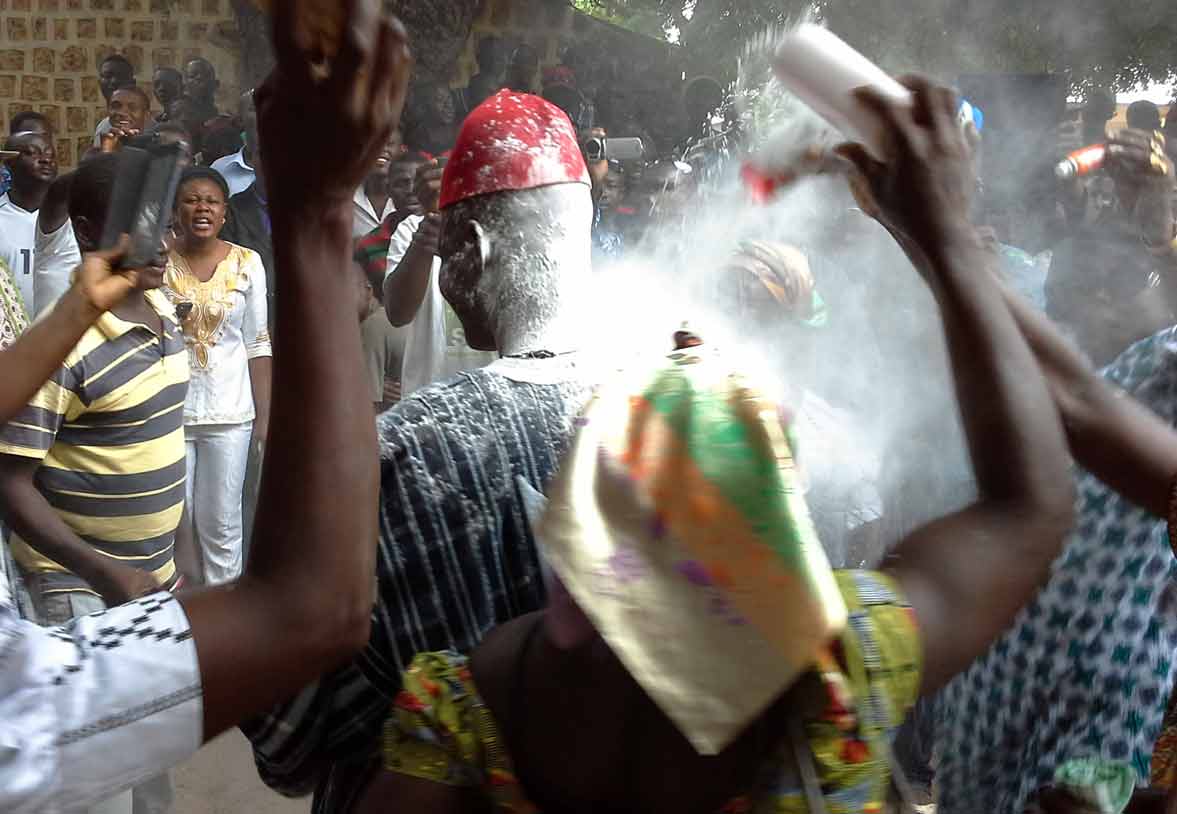 |
|
White powder is sprinkled over his body. |
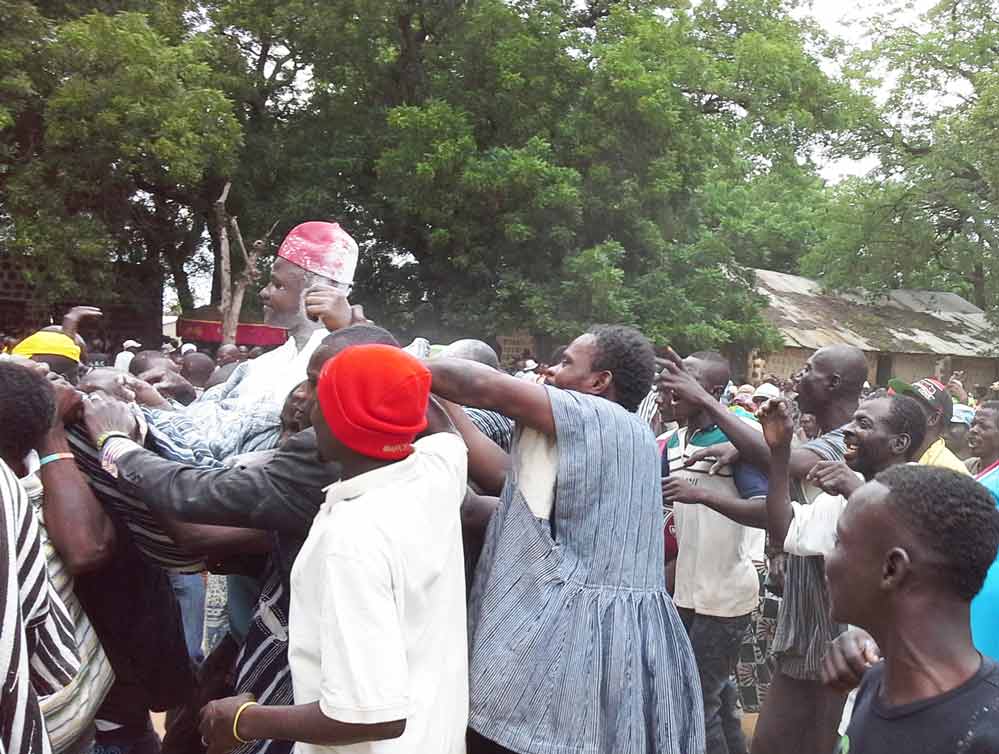 |
|
He is carried shoulder high by his supporters. |
Now known by his official traditional title, Chief Amalugsi Atirepkere III, the young chief is a policeman by profession and is stationed in Tamale where he is also pursuing a professional course in Fundamental Accounting, Business Law and Communication at the Polytechnic Institute. In a short interview granted our journal a few days after his election, the young dynamic chief outlined his vision for Gbedembilisi and the many challenges facing the village which is known for its fertile rice valleys. The village has a population of nearly 1,000 inhabitants. He, a policeman cum chief, has hit the ground running and is very passionate about his job and role as a traditional leader. While functioning as regent, he put a number of good measures in place to lay the ground for a smooth reign when he mounts the throne. He was the late chief’s, his father’s choice as successor and enjoyed a lot of support among his people. Thoughtful and on top of issues in Gbedembilisi, the new chief outlined the tough challenges and difficult tasks he and his village community have to face. Convincingly committed and willing, the young man is on track in matters that he can directly control, as seen in some of the following matters:
Alcohol
The chief has put tough restrictions on the sale and consumption of alcohol in the village. Retailers are not allowed to bring more than two gallons of alcohol to the village each month, and selling alcohol in homes is not allowed (in accordance with the ban ordered by the Paramount Chief in April this year). The restrictions became necessary after many young people in the village took to drinking and started getting addicted. The results are health hazards and less farming activity on their part. Much as he understands their frustration, and despair often resulting from the inability to use the farming opportunities afforded by the fertile land to the full, which is also due to the lack of government support in the supply of agricultural inputs and provision of social facilities as well, the young chief has no other option than to resort to drastic measures to prevent the situation from getting out of control.
Fishing
The River Sisili offers good opportunities for fishing and has attracted fishermen from neighbouring villages: Yipkabongo, Yagaba, Jaadem and Kategra. These fishermen often use larger nets, nets the inhabitants of Gbedembilisi can hardly afford. The result is overfishing and less catch for fishermen using smaller nets. The new chief has restricted the use of nets to only smaller ones. This way, a fair deal and equal opportunities are given to all fishermen.
Meat
Chief Amalugsi Atirekpere III has set a committee to look into the possibilities afforded by hunting as a supply of bush meat. While hunting is allowed, the practice of bush burning to force animals out of their habitat is strictly forbidden. The committee is tasked with keeping vigilance on the activities of hunters and preventing bushfires.
Road
The chief thinks the state of the road leading from Baasa in Fumbisi to Gbedembilisi is generally acceptable, but he wishes to appeal to the South Bulsa MP, District Chief Executive and the Assembly to help get the part of the road that goes through the valley raised to prevent water from collecting there in the rainy season and making its use difficult.
Education
Gbedembilisi has only one school, a preparatory (primary) school and three teachers. The chief says the school building needs urgent renovation (broken windows and doors and damaged ceiling and walls) and better desks and chairs. Talking about the extent of the damage, Chief Amalugsi Atirekpere summarized it this way, “If you see the school building and they ask you to send your child to that school, you will never agree to do so.” It is little wonder that teachers are reluctant to be posted to the village, which has neither electricity nor potable water supply. Between February and May, the wells dry up and the only source of water is the river. The risk of people catching waterborne diseases is very high in that case.
Health
Even though there is a building intended to function as a health centre, there is neither a resident nurse nor stock of drugs to meet even common ailments like headaches, running stomachs or coughing. To put it bluntly, there is no health facility in the village. The chief adds, “If anyone is unfortunate to be bitten by a snake, it is the death sentence for that person. Before the person is rushed to Fumbisi where he is likely to get treated, and that is if the health post there has serums against snakebite, it will be too late.”
Farming
The Gbedembilisi valley is the most fertile of the South Bulsa valleys, the chief tells me. Given good rains it is possible to cultivate food crops and harvest in abundance: rice, maize, beans, cowpeas and different sorts of vegetables. An acre of land can yield up to six or seven bags of beans, cowpeas or rice and up to ten bags of maize. Rice grows very well in the valley and can be harvested after three or four months. People in the village are subsistence farmers. When the rains are good they get a good harvest, enough to feed their families till the next harvest and still have surplus to sell for money. And they must earn some money too to be able to afford fertilizers, weedicides, insecticides and other farm inputs which are quite expensive. A bag of fertilizer costs up to GHC 100, which is a lot of money for a subsistence or small-scale farmer.
There is a lot of commercial farming going on in Gbedembilisi at the moment, mostly by rich farmers from the Northern Region. Much of the produce is taken out of the district, and without any levy being imposed on it.
The chief wishes irrigation facilities for the village as it will allow all-year farming and benefit his people, indeed the whole Bulsaland for that matter, by providing people with work and ensuring food security. Given adequate irrigation, the valley can meet much of the food needs of Northern Ghana because “it is very fertile, more fertile than any other valley in the area.” It would also help them if mounds are constructed in the valley to prevent rain water from flowing out to the stream and into River Sisili when it is needed in times of little rainfall. The mounds will be used to control the amount of water that is needed in the valley in the rainy season. When there is too much water, they are opened to allow some of it to flow into the stream, but when there is little water the mounds stay closed and keep it in the slopes of the valley and fields.
It is an irony of policy making in Ghana that so much is spent on importing rice while vast fertile valleys like those in Wiesi and Gbedembilisi get little attention and are underused. One does not need to be an expert in agriculture to know that irrigation facilities will attract more farmers to the valleys, increase employment opportunities and food production and boost commercial activity, which in turn can bring the new district more revenue for other development projects. It is hard to understand and accept why the valleys have seen virtually no improvement since the 1970s when commercial farming started there.
When Chief Amalugsi Atirekpere and I phoned in October 2014, he said that there had been no rains in four weeks and the rice harvest was in danger. Only farmers who planted the three-month rice species would get some harvest. If the situation continued those who planted the four-month rice species would get very little harvest and make a huge loss in the money they invested in rice production this year.
Land encroachment
The fertile soil of the Gbedembilisi valley is also a cause of worry for the chief and his people because the neighbours, mostly Yagaba and Jaadem, have started encroaching on their land. In fact, the problem is a Bulsa problem and the Paramount chief and Bulsa political leaders will have to get active and ensure a clear demarcation between Gbedembilisi and its neighbours before serious conflict emerges in the area. While Yagaba territory ends at the Yagaba Bridge, the Mamprusi dominated Saveaba in the area have crossed the bridge to Gbedembilisi and started farming in the valley without permission. They also want to claim the two tributaries of the Sisili River that lie in Bulsa territory. The chief says complaints he has made to the Yagaba chief have not really yielded good results. The encroachment has not stopped. He has already informed Paramount Chief Azagsuk Azantilow II about the problem and hopes that when he visits Gbedembilisi and the valley in November as part of his Bulsa tour he will be able to see and assess for himself the extent of the encroachment going on there. Both the MP and DCE for Bulsa South have been informed about the problem. Whatever the case, Chief Amalugsi Atirekpere wants to have a clear-cut land demarcation to prevent the potential conflict situation brewing in the area from escalating. Farmers are welcome to use the valleys so long as they acknowledge Gbedembilisi and Bulsaland as the rightful owners, he stresses.
It is obvious that the challenges facing Gbedembilsi cannot be tackled by the chief and his elders and people alone. The Bulsa South Member of Parliament, District Chief Executive and District Assembly will have to go to the aid of the young chief and his people.
The chief has invited me to visit his village when I am in Buluk next time, and I will do so. A visit will help me assess things for myself and our journal.
Literature on the Gbedembilisi rice project based on field-research:
Konings, Piet1984
Capitalist Rice Farming and Land Allocation in Northern Ghana, Journal of Legal Pluralism and Unofficial Law (Littleton, Colorado), 22, 89-119.